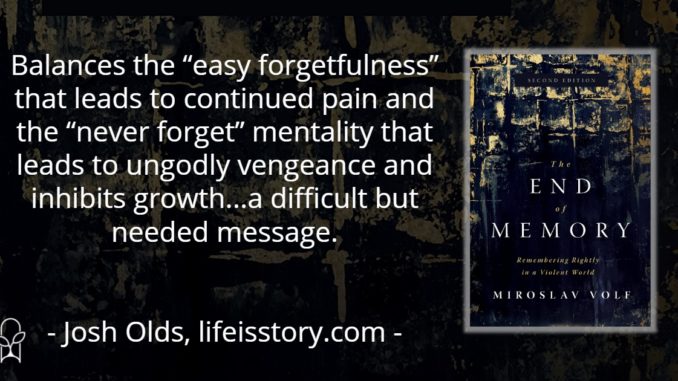
Also by this author: The Home of God: A Brief Story of Everything
Published by Eerdmans on January 12, 2021
Genres: Academic, Non-Fiction, Theology
Buy on Amazon
Goodreads

Winner of the Christianity Today Book Award in Christianity and Culture
How should we remember atrocities? Should we ever forgive abusers? Can we not hope for final reconciliation, even if it means redeemed victims and perpetrators spending eternity together?
We live in an age that insists that past wrongs—genocides, terrorist attacks, bald personal injustices—should never be forgotten. But Miroslav Volf here proposes the radical idea that letting go of such memories—after a certain point and under certain conditions—may actually be a gift of grace we should embrace. Volf’s personal stories of persecution and interrogation frame his search for theological resources to make memories a wellspring of healing rather than a source of deepening pain and animosity. Controversial, thoughtful, and incisively reasoned, The End of Memory begins a conversation that we avoid to our great detriment.
This second edition includes an appendix on the memories of perpetrators as well as victims, a response to critics, and a James K. A. Smith interview with Volf about the nature and function of memory in the Christian life.
We live in a world where we would rather move on from the atrocities of our past, where a common cultural religion tells us to “forgive and forget.” Amid all of that, Miroslav Volf calls us to remember. Drawing upon his own traumatic past and difficulty in forgiving his military interrogators in the former Yugoslavia, Volf argues that correctly remembering the wrongs done to us—with all their trauma and pain—is a necessary precursor to justice. It is only within the context of remembering rightly that we can begin the process of reconciliation.
The End of Memory draws particularly upon the Exodus and the Passion as examples of remembering and, indeed, sacralizing, traumatic events. In both cases, remembering a traumatic experience shapes the covenantal community. “For you were slaves in Egypt” is a constant refrain in the Old Covenant Law. Reflection on the death of Jesus is endemic to the New Covenant, where the common-union of believers is celebrated by remembering Christ’s death.
Volf also advocates for the hope of reconciliation. There is no vengeance in remembrance or in justice. Rather “since the memory of the passion is an eschatological memory of the anticipated final reconciliation, I will remember every wrongdoing in the light of that hopeful horizon of future reconciliation with the wrongdoer” (pg. 123). Though it is painful, The End of Memory asks us to recognize our wrongdoers through the eyes of Christ, as one whom Christ loves and desires reconciliation with. The struggle to forgive permeates the book as Volf calls readers to do the hard work of loving one’s enemies.
Yet Volf also concedes that certain memories, under certain conditions should indeed be purged—that forgetting can be a gift of grace that we should embrace. This third part of the book seems almost a paradoxical twist to the argument that Volf has built, but what The End of Memory has done has shown us when memory should end. Volf’s thesis is that, in the world to come, we will not remember those traumas. This is an even greater struggle than what Volf presents in the book’s second part.
In a postscript, Miroslav Volf imagines what reconciliation between him and his interrogators would look like. It’s a very personal, therapeutic fiction that exemplifies the hope of reconciliation and the freedom in forgetting that comes with a restored relationship. It’s an intensely raw and emotive conclusion that shows just how personally invested Volf is in this topic. While The End of Memory is an academic work, its pathos is incredibly personal.
As a second edition, this volume includes an additional chapter on the memories of perpetrators and victims, offers a reflection on fifteen years of reflection and a response to criticism of the first edition. Finally, it records an interview with James K.A. Smith, in which Volf expands a clarifies some of his comments. These additions show that The End of Memory is a living theology. It’s growing, adapting, and being refined. Volf doesn’t claim to have it all figured out, or to perfectly follow what he believes he has figured out, but acknowledges his own imperfections and the movement of his thought on the topic through the years.
In the end, Volf’s plea is this: Work at discerning what kind of remembering is worthy of our shared humanity. The End of Memory is a difficult work, both in theory and practice, but it presents a Christlikeness that balances the “easy forgetfulness” that leads to continued pain and the “never forget” mentality that leads to ungodly vengeance and inhibits growth.
My one concern about the book is that Volf keeps the conversation in the philosophical and does little work in the practical. Recall that the culmination of his own traumatic experience comes in the form of an imagined and not a realized reconciliation. This is a good word for those who are separated from their abusers and whose reconciliation is mental or distant, but what of those actively enduring abuse? Because The End of Memory is so personal to Volf and because his own trauma happened decades ago, it is perhaps easier for him to advocate on behalf of the abuser (in a sense) than it is for those who are actively or recently enduring abuse. The book could better have balanced an understanding of the psychology of abuse with the theological goals of reconciliation. Regardless, Volf’s perspective makes one pause and consider if, in remembering, we are harming ourselves and others.
